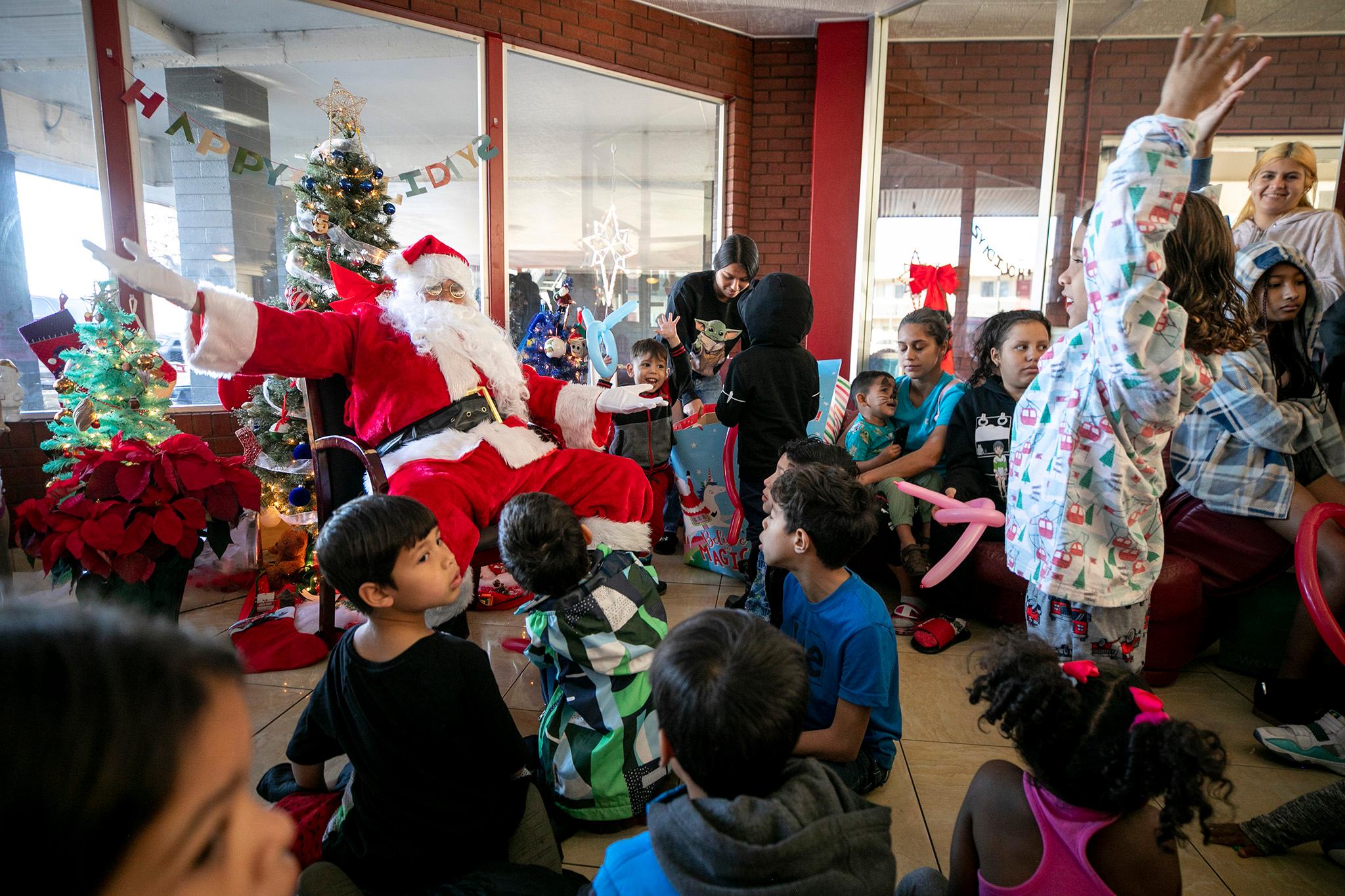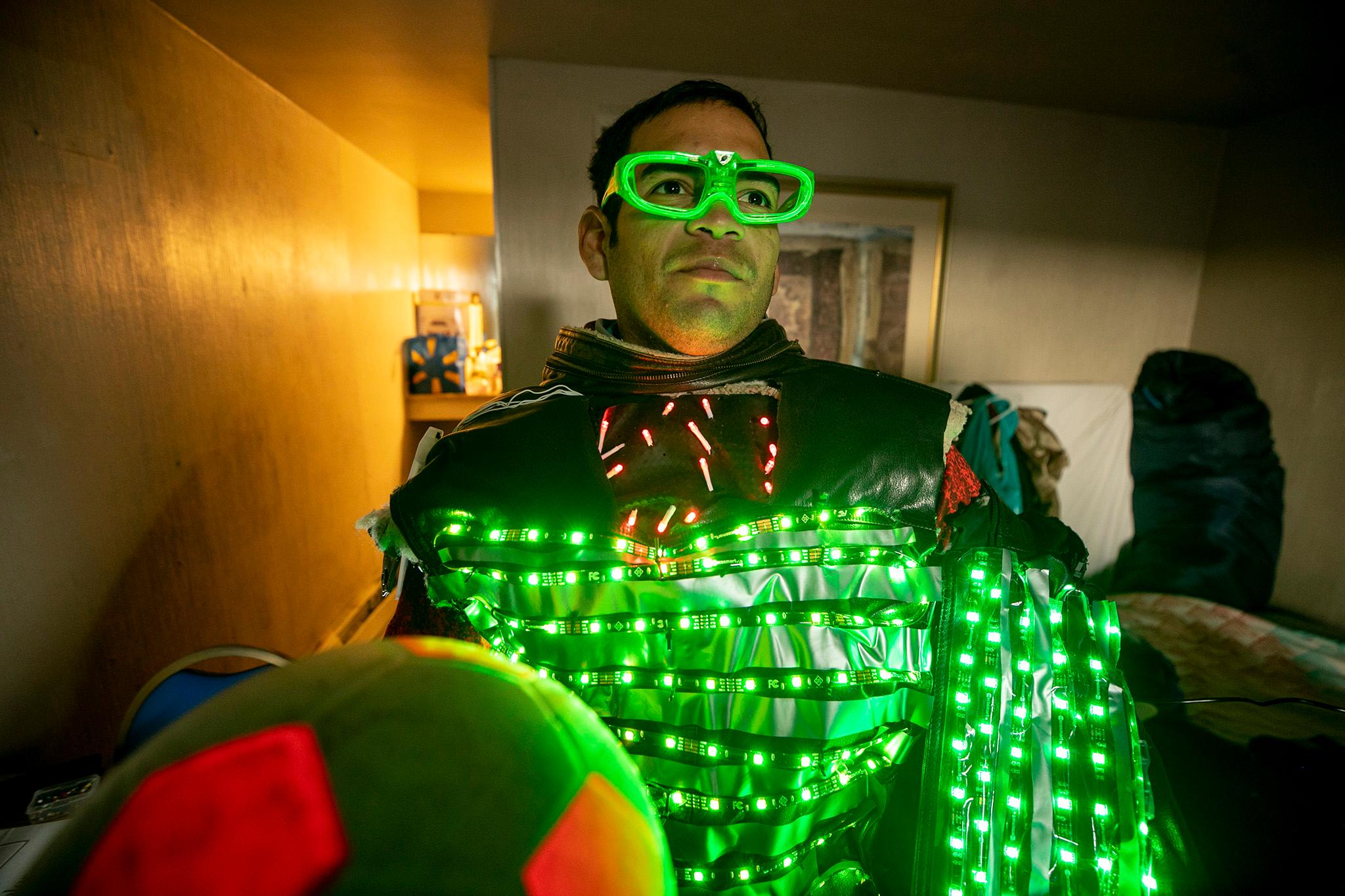A chorus of "oohs" and "ahhs" rang out in a hallway at Stanley Marketplace as a group of young, bright-eyed children watched Jesús Rafael Abreu -- dressed in a sparkly blue vest and a splash of clown make-up -- juggle three red and white clubs.
Abreu, one of thousands of mostly Venezuelan migrants who have arrived in Denver the past year, made his way across seven countries and is carving out a small space in the city's entertainment world doing what he knows best: making others laugh as Yupi the Clown.
"I identified myself [as a clown] when I was 23," Abreu said. "If I could right now, I would change my name."
The 29-year-old Venezuelan arrived in Denver in the closing months of 2023.
He was sheltered by the city government in Globeville's Radisson Hotel for two weeks before ending up on the frigid Denver streets, sleeping inside of a tent. That experience, he said, nearly broke his spirit.
"In the tent I cried more," Abreu said. "In the morning they were looking for me to be a Santa Claus for the children, but inside...I was cut on the inside from the sadness."

Known among his fellow recent arrivals as "El Payaso Yupi," Abreu has garnered a reputation as the community's beloved clown since getting to Denver. While still living in a tent, Abreu was invited to perform for children living in the Western Motor Inn migrant community, dressing up as Santa Claus and a few other times as Yupi.
On Christmas Eve, Abreu and his partner, Maria Gabriela Alcina Figueroa, were invited to stay in the run-down motel by the owner, who had been sheltering hundreds of other recent arrivals.
"We never went hungry here," Abreu said. "We are immensely grateful for our time here."
After traveling to the U.S. with her brother, sister-in-law and two children, Figueroa met Abreu in Denver and have since started up a relationship. They're also trying to start a small business around Yupi the Clown, booking performances at birthday parties and community events thanks to the help of local volunteers.

Black crates stuffed with Wal-Mart Christmas lights, scissors, metal wires, pins, paper and other miscellaneous items lined a wall inside of Abreu's motel room.
Next to his bed sat an old white space heater that he fixed and on his bed was an old sewing machine that someone recently donated. On the back wall leaned a mattress with plastic hooks holding up various clown outfits that Abreu and Figueroa have created. Living in Venezuela, Abreu said he learned not to waste a single item.
"I was asked by a company if I had a show," Abreu said, recounting his first paycheck as a performer. "Yes, of course I have a show, I said. What [the businessman] didn't know is that my show was made using a bunch of thrown away clothes."

Any item has the potential to be used in his clown acts, he said. Holding up the remains of a women's boot with a missing sole, Abreu slipped his hand through and donned what now looks like black cuffs wrapped around his forearm. He smiled while showing off the ingenuity behind costumes that he spends countless hours creating, often into the late night.
"Normal people sleep. I wasn't sleeping. I didn't get tired, I spent all day doing it," Abreu said. "At least [Figueroa] doesn't tell me to go to sleep, rather she says 'make coffee.' I am sure that in the future I will have time to rest, but not right now."
Missing from his collection is a silver unicycle that he attempted to carry through the Darien Gap, a dangerous route that hundreds of thousands of migrants have traversed in recent years. He had to leave it behind once the group he was traveling with came up to a treacherous ravine.
"I sat with him, like a person. I explained to him why I had to leave him," Abreu said. "When I wasn't with him I felt alone. That unicycle traveled with me through five countries."

Abreu began his clowning days while leading a troupe of entertainers back home in Venezuela.
"In my country, I have a clown joke on the door of the house," Abreu said. "And my wall was marked "Payaso Yupi." And my car had "Yupi" plastered on it."
He studied tourism in Venezuela and worked as an events promoter, a tour guide and managed a troupe of under-resourced performers. He wore many hats leading his circus in Venezuela, doing what he could to accrue enough funds to pay his performers and invest in new gear.
"I never liked it when people gave me food," Abreu said. "If you are going to give us a gift, give us a package of balloons...We want to earn a meal."

Despite shouldering the responsibility of a small circus that helped him get by, Abreu chose to leave for the United States after, he said, he received a message from God in a dream.
"I travel because I had a dream and God told me to travel," Abreu said. "And I prefer to listen to God."
Abreu originally planned to head for New Jersey to meet with a cousin. After she stopped responding to his messages, he was left with nowhere else to go, so he chose Denver based on the recommendation of other migrants along the way. Performing on street corners in Texas, Abreu saved up enough funds to purchase a bus ticket to the Mile High City.


Abreu will turn 30 this month, and he has high hopes for this next decade in his life.
He and his partner are in the process of moving out of the motel with a volunteer willing to house them in a larger space. His hope is to eventually start his own clown company, find more gigs to perform at and eventually do business back and forth between Denver and Venezuela, though it's not entirely clear how he'll achieve that.
As for his Stanley Marketplace performance, Abreu said he felt it went very well. He said opportunities to make money like this, from actual work, are different from when he's forced to panhandle.
Honest work like this, that both comes from and creates joy, Abreu said, brings "happy" money.
"It's money, but it's blessed...The blessings come faster because five blessed dollars is not the same as five hundred cursed dollars," Abreu said.

 Thanks for the support, Denverites!
Thanks for the support, Denverites! 
